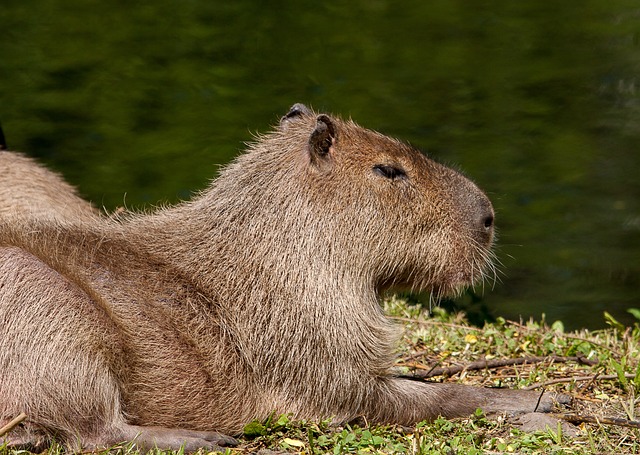Capybara Potty Training Basics
Capybaras are social animals that are often kept as pets. They are intelligent and can be trained to use a litter box just like cats.
However, potty training a capybara requires patience, consistency, and understanding of their behavior.
When potty training a capybara, it is important to provide them with a designated area for elimination. This can be a litter box or a specific spot in their enclosure.
The area should be easily accessible and cleaned regularly to maintain hygiene.
Capybaras have an instinct to mark their territory, so it is important to use a scent neutralizer to eliminate any residual odors that may attract them to the wrong spot.
Positive reinforcement such as treats or verbal praise can also be used to encourage them to use the designated area.
It is important to note that capybaras have a unique digestive system that requires them to defecate frequently.
This means that they may need to use the designated area multiple times a day. Consistency in training and providing access to the designated area will help them develop good habits.
In summary, potty training a capybara requires patience, consistency, and understanding of their behavior. Providing a designated area, using a scent neutralizer, and positive reinforcement can help them develop good habits.
Preparing for Potty Training
Before attempting to potty train a capybara, it is important to create a suitable environment and choose the right litter. These steps will help ensure success in the potty training process.
Creating a Suitable Environment
Capybaras are semi-aquatic animals that require a lot of space to move around and explore. When preparing for potty training, it is important to create a designated area for the capybara to use as a bathroom.
This area should be located away from the capybara’s sleeping and eating areas.
The designated bathroom area should be covered with a material that is absorbent and easy to clean. Some suitable options include newspaper, puppy pads, or artificial turf.
It is important to avoid using materials that may be harmful to the capybara, such as cedar chips or clay litter.
Choosing the Right Litter
When choosing litter for a capybara, it is important to consider their natural habitat. Capybaras are semi-aquatic animals and are accustomed to using water to clean themselves. Therefore, it is recommended to use a litter that can be easily dissolved in water.
Some suitable options for capybara litter include recycled paper pellets, wood shavings, or hay. It is important to avoid using clay litter or litter that contains chemicals or fragrances, as these may be harmful to the capybara.
By creating a suitable environment and choosing the right litter, capybara owners can help ensure success in potty training their pets.
Training Techniques
Positive Reinforcement Methods
When it comes to potty training a capybara, positive reinforcement is key. Rewarding good behavior with treats and praise can help the animal understand what is expected of it. Capybaras are social animals and enjoy interaction with their owners, so positive reinforcement methods can be effective in training them.
One effective method is to offer a treat immediately after the capybara has used the designated potty area. This reinforces the behavior and encourages the capybara to repeat it in the future. It is important to use small, healthy treats and not overfeed the animal.
Consistency and Routine
Consistency and routine are also important when potty training a capybara. The animal should have a designated potty area that is easily accessible and consistently used. The owner should also establish a routine for taking the capybara to the potty area, such as after meals or at regular intervals throughout the day.
It is important to be patient and consistent with training, as capybaras may take longer to learn than other animals. Punishing the animal for accidents is not effective and can actually hinder the training process. Instead, owners should remain positive and reinforce good behavior with treats and praise.
By using positive reinforcement methods and establishing a consistent routine, capybaras can be successfully potty trained. With patience and dedication, owners can enjoy a cleaner and more hygienic living space for their pet capybara.
Common Challenges and Solutions
Potty training a capybara can be a challenging task, and there are several common challenges that owners may face. Here are some solutions to these challenges:
Challenge: Accidents Happen
Capybaras are known to have accidents, especially when they are young. They may not understand that they need to go outside or in a designated area to relieve themselves. This can be frustrating for owners who are trying to potty train their pet.
Solution: Consistency is Key
Owners need to be consistent when potty training their capybara. They should take their pet outside or to the designated potty area regularly, especially after meals or naps. Positive reinforcement, such as treats or praise, can also be used to encourage good behavior.
Challenge: Stubborn Behavior
Some capybaras may be stubborn and refuse to use the designated potty area. They may prefer to go wherever they please, which can make potty training difficult.
Solution: Patience and Persistence
Owners need to be patient and persistent when potty training a capybara. They should continue to take their pet to the designated potty area and use positive reinforcement. If the capybara continues to have accidents, owners should clean up the mess and try again later.
Challenge: Medical Issues
In some cases, capybaras may have medical issues that make potty training difficult. They may have bladder or bowel problems that require medical attention.
Solution: Consult a Veterinarian
If a capybara is having difficulty with potty training, owners should consult a veterinarian. The veterinarian can examine the capybara and determine if any underlying medical issues need to be addressed. Once the medical issues are resolved, potty training can continue.




